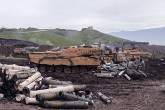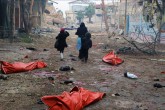The Syrian crisis was ignited by the popular protests against Bashar Assad’s despotic regime in March 2011. In the course of events, the crisis started as a civil war and then turned first into a regional, then a global crisis. Regional and global powers such as Iran, Turkey, Saudi Arabia, Russia and the United States are deeply involved in the war. With this foreign interference, the overthrow of the regime has become more difficult. On the one hand, strong states such as Iran and Russia have saved the Assad regime from the brink of collapse. On the other, the U.S. and its regional allies such as Saudi Arabia and the United Arab Emirates have initiated a war of attrition against the Syrian opposition until it was weakened and dissolved.
Unlike Russia, the U.S. did not take any initiative in the Syrian war, and besides providing arms support to the Democratic Union Party’s (PYD) People’s Protection Units (YPG), an offshoot of PKK – which is officially recognized as a terrorist organization by both Turkey and the U.S. Cooperation with such groups, and bypassing traditional allies weakened the position of the U.S. The U.S. could not even pronounce a well-defined position regarding the overthrow of the Assad regime. There were only some awkward statements. For instance, former President Barack Obama had declared the use of chemical weapons to be a redline, but when the regime used them and killed thousands of civilians, the U.S. did nothing. In many cases, the U.S. hesitated to support the country’s majority Sunni Arabs.
After Russia’s direct intervention in September 2015 and the Astana and Sochi negotiation talks, the U.S. was sidelined in the crisis. In response, it began to invest more heavily in the YPG, claiming that it is the only relevant actor in the U.S. fight against Daesh. Considering that the YPG is a direct threat to Turkey’s security, Ankara immediately reacted to the U.S. support for the YPG.
The U.S. position can be interpreted from two perspectives, both of which Ankara rejects. The first possibility is that the U.S. political leadership fails to read the developments on the ground in the Middle East. The confusion between U.S. institutions of the administration causes ups and downs and uncertainties in U.S. policy on the crisis. The policy on the Assad regime is not clear and the U.S. hesitated to support the Syrian opposition. Until very recently it was clear that the U.S. was fighting against Daesh. However, now, even this is not taken for granted, considering the evacuation of Daesh militants from Raqqa with their heavy weaponry after an agreement reached by the U.S.-allied YPG and Daesh.
The second possibility is that the U.S. knows what it has been doing in the region. It can be claimed that the U.S. does not want stability in Syria or in the Middle East, because it has been creating artificiality in Syria by allowing the YPG to change the demography of the territory under its control, namely by replacing Arabs with Kurds. For instance, leaving control of Raqqa to the YPG will only create political and social problems between Arabs and Kurds in the near and distant future. The U.S. leadership knows that drawing borders in the region is not an easy task, considering that most of the conflicts in the Middle East have been the result of the previously drawn borders global powers.
Excluding regional powers such as Turkey and Iran from power calculations is the biggest obstacle for the U.S., or any other global power, to design a project for the region. Alienating both Iran and Turkey at the expense of the YPG or some other small actor is not rational. Both Turkey and Iran consider the declaration of a Kurdish statelet in the region as a redline. Also, we witnessed how the two reacted against the independence referendum in Iraqi Kurdistan several months ago. The U.S. leadership is well aware that the existence of any political entity in the Middle East is impossible without Ankara and Tehran’s consent. Therefore, arming the YPG or some other non-state actor will only create further problems for regional states rather than bring stability in the region. That is, the current American policy is not about the reconstruction of the region.
The Turkish political leadership is determined to thwart all projected formations on its borders. Ankara will not tolerate any political entity that damages the territorial integrity of the country. Finally, the current U.S. policy may end with the loss of a traditional NATO ally that will cost too much for the U.S. Taking into consideration the support that Turkey has received for Operation Olive Branch, it can be asserted that the U.S.’s unilateral and arrogant policy will not be sustainable.
[Daily Sabah, 30 January 2018]
In this article
- Opinion
- 2011
- 2015
- 2018
- Assad Regime
- Astana
- Astana Peace Talks
- Astana Process
- Astana Talks
- Bashar Al Assad
- Civil War
- DAESH
- Daily Sabah
- Democratic Union Party (PYD)
- Fight against DAESH
- Fight Against Terror
- Global Actors | Local Actors
- Global Power
- Iraq
- Islamic Republic of Iran
- Kurdistan Workers' Party Terrorist Organization (PKK)
- Middle East
- NATO
- NATO Ally
- Opposition
- People's Protection Units (YPG)
- PKK - YPG - SDF - PYD - YPJ - SDG - HBDH - HPG - KCK - PJAK - TAK - YBŞ
- Regional Power
- Russia
- Saudi Arabia
- Sochi
- Sochi Peace Talks
- Sochi Summit
- Sunni
- Syria
- Syrian Civil War
- Syrian Conflict
- Syrian Crisis
- Syrian Opposition
- Syrian Peace Process
- Syrian Regime
- Terror
- Turkish Foreign Policy
- Turkish-American Relations
- Türkiye-US Relations
- Türkiye's Foreign Policy
- Türkiye’s Operation Olive Branch
- United Arab Emirates (UAE)
- United States (US)



